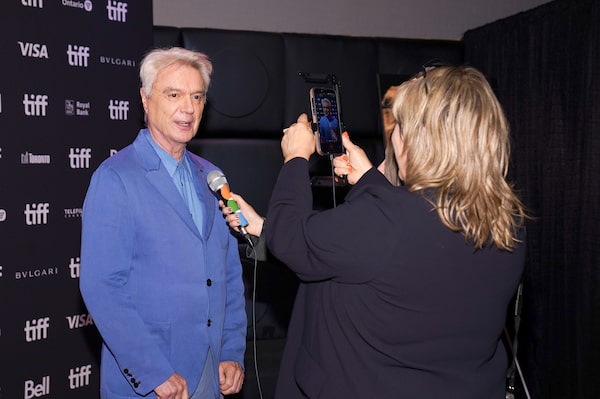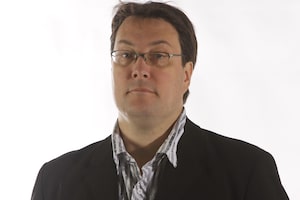David Byrne performs with Talking Heads in a still from the film Stop Making Sense. The concert documentary, directed by Jonathan Demme, is returning to theaters later this month.VIA RHINO/The New York Times News Service
At the end of the premiere screening of the newly restored version of the acclaimed 1984 concert film Stop Making Sense at the Toronto International Film Festival, it occurred to the Talking Heads musician Jerry Harrison that it was too short. “It went by so quickly that I wanted to watch it again,” he says, speaking the next day. “I thought to myself, ‘Is it over already?’”
It is over – has been for some time. The Talking Heads broke up in 1991. But they have reunited for the festival and for an interview in a downtown hotel. Here they are, sitting around a coffee table, attention turned to their smartphones during a break between journalists. “I have to call my wife,” Harrison says, excusing himself. Drummer Chris Frantz, a bit paunchy, wears a shirt with an alligator logo. His wife, bassist Tina Weymouth, sports dark glasses because of a scratched cornea.
“I’m having difficulty with the light in my eyes,” she explains.
And frontman David Byrne, who recently said he behaved like a “little tyrant” during the band’s breakup, and whose high cheekbones, quirky gestures and thousand-mile black-eyed stare often were the mesmerizing focus of the film. He’s a softer figure now, with a shock of white hair, a blue blazer and the gentle mien of a small-town pharmacist.
Harrison’s thoughts on the fleetingness of the Stop Making Sense screening are apropos. The centrepiece of film directed by the late Jonathan Demme is Once in a Lifetime, a song about living half-awake on autopilot and then waking up to the question, “How did I get here?”
They got here because the film’s original distribution deal expired, which allowed Harrison to give the film a 4K restoration. It releases exclusively in IMAX on Sept. 22, with full theatrical run elsewhere a week later. “We took advantage of new technology,” Harrison says. “All these things came together.”
Trauma, opera and a severed head: How Atom Egoyan revisited the Salome spotlight

David Byrne attends the Stop Making Sense premiere during the 2023 Toronto International Film Festival at Scotiabank Theatre on Sept. 11.Shawn Goldberg/Getty Images
Watching Stop Making Sense now and seeing themselves nearly 40 years after the fact drew varying reactions from the four members of the band.
“It was surreal,” Weymouth says.
Frantz was more sentimental. “When I watch it, I’m so grateful that I was able to be part of this.”
And Byrne, about seeing his face close-up on a giant IMAX screen: “I was thinking, ‘skin care.’”
What was clear to all of them was that the music stood up and that the performance and look of the band still felt relevant. “I’m not seeing eighties,” Byrne says. “There are no unfortunate haircuts.”
Though Byrne once said that a Talking Head reunion would be an “exercise in nostalgia,” the return of the film is a fresher sensation. The performance, captured over four nights in 1983 at the Pantages Theatre in Hollywood, represents a band at the peak of its powers, performing bright, kinetic pop that was the funkiest new wave around. The film’s editing by Demme and Lisa Day focuses on the joyous synchronization of an ensemble of four core bandmates and five others.
The crowd is not shown much at all in the film – it was felt the lighting needed to shoot them would blunt the audience’s energy. So, pure performance, not rock concert, on the screen. The fans at the TIFF screening behaved as if they were at a live show, clapping and dancing often.
On Once in a Lifetime, Byrne is in sermonizing form in the verses, with the baptismal chorus (“Letting the days go by, let the water hold me down”) more about rebirth than reliving.
“It’s not nostalgia,” Weymouth says, “it’s nowstalgia.”
Muted opening weekend puts focus on films instead of celebrities, with mixed results
The concept of the movie, which was a typical show on the band’s 1983 tour, came from Byrne. A director, Demme, was brought into film it, in much the same way Byrne brought in filmmaker Spike Lee for his 2020 concert film American Utopia. (Lee hosted the onstage Q&A with the four Talking Heads this week at TIFF for Stop Making Sense.)
As sophisticated as the 1983 concert was, its brilliance was intimately theatrical, not extravaganza – human, not razzle dazzle. Byrne has seen the big shows by Beyoncé and others, and while he admits they are a lot of fun, “It’s not always emotionally moving. You’re just kind of bowled over by the spectacle.”
The Talking Heads got back together in 2002 for the band’s induction into the Rock and Roll Hall of Fame, and the press has used the word “reunited” for the TIFF premiere of Stop Making Sense. A full-fledged reunion, however, whether for a lucrative tour or for an album, does not seem to be in the cards for the band who once sang “Never for money, always for love – cover up and say goodnight.”
The fans want it, no doubt the concert promoters want it, perhaps even one or more of the band members want it. But?
“A wish,” Weymouth says, “is just a wish.”
 Brad Wheeler
Brad Wheeler